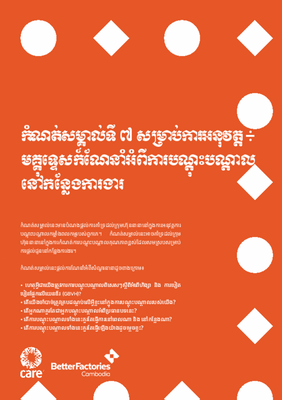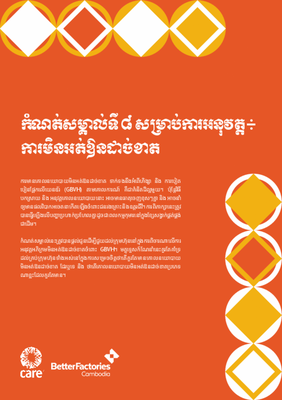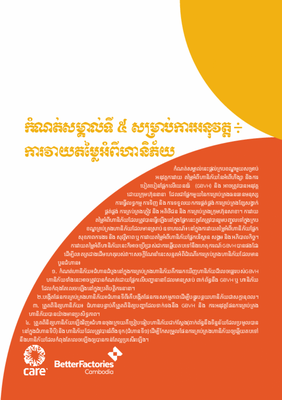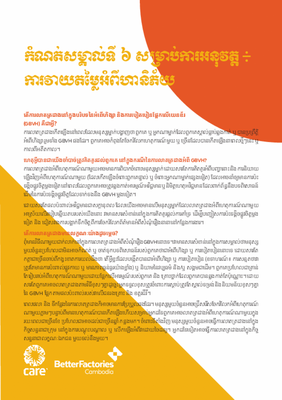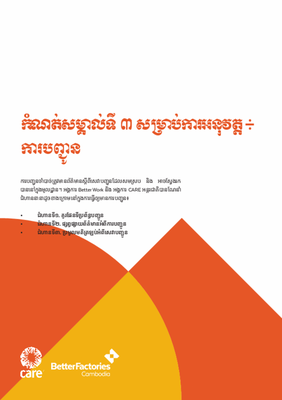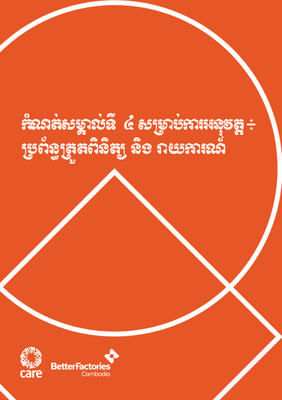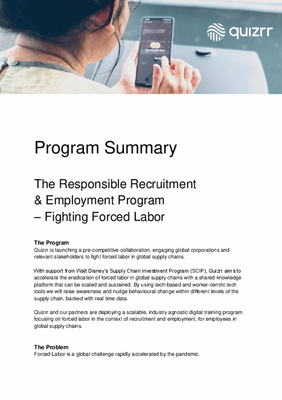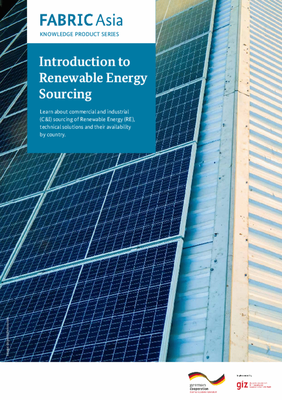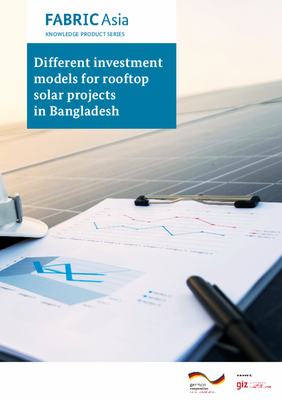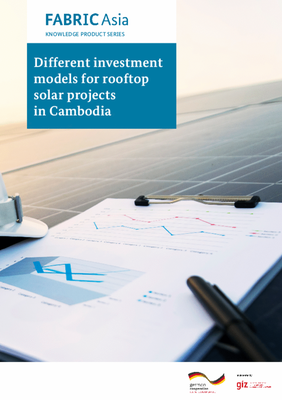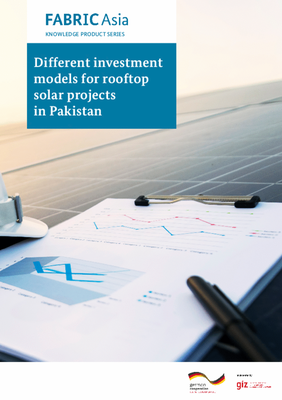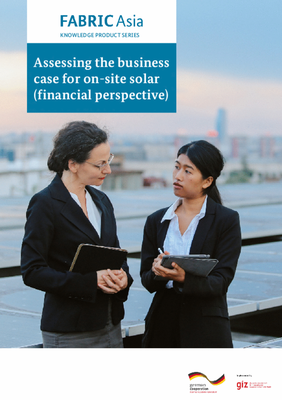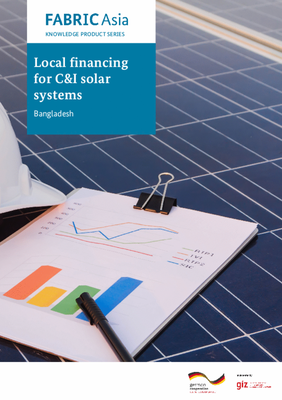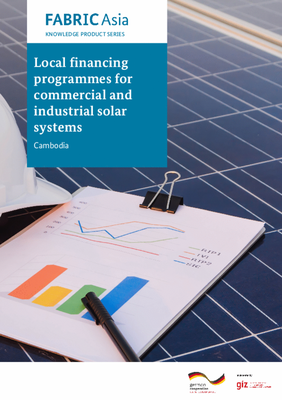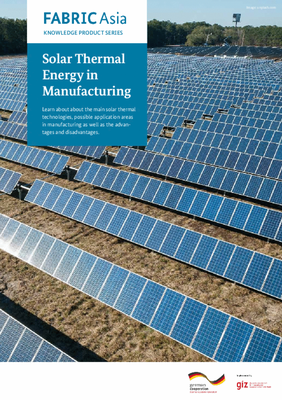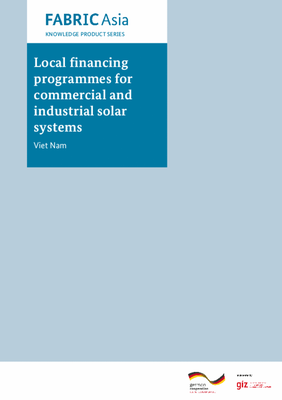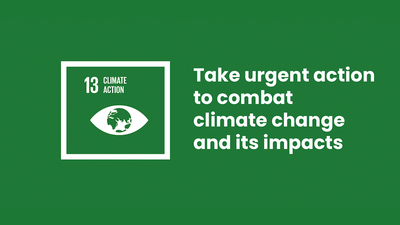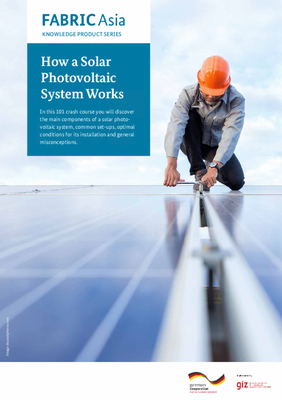Care & Better Factories Cambodia - Guidance Note 7: Guide to Workplace Training in Khmer
This note is intended to support companies undertaking training of their workforce. The note may support companies in identifying suitable high-quality training to provide in the workplace. The note gives guidance on the following questions: Why do we need specific trainings on...
View
|
Full View
|
Download
 Asia Garment Hub
|
January 10, 2022
Asia Garment Hub
|
January 10, 2022
Care & Better Factories Cambodia - Guidance Note 8: Zero Tolerance in Khmer
Having a zero-tolerance policy in relation to gender based violence and harassment (GBVH), in principle, is a good idea. However, how that policy is expressed and put into operation can have different outcomes and potentially lead to unintended consequences for victims and...
View
|
Full View
|
Download
 Asia Garment Hub
|
January 10, 2022
Asia Garment Hub
|
January 10, 2022
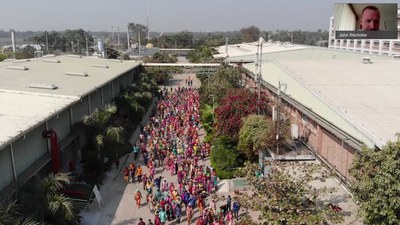
Third-party content disabled. Consent to activate.
Highlights from the webinar "How can Social Dialogue help us get through the crisis together"
This video features highlights from the webinar "Getting through the crisis together" - an online seminar series by GIZ FABRIC, which is jointly organized by GIZ FABRIC and ILO’s Decent Work in Garment Supply Chains Asia project. The webinar will focus on social dialogue as a key...
View
 Asia Garment Hub
|
January 05, 2022
Asia Garment Hub
|
January 05, 2022
Care & Better Factories Cambodia - Guidance Note 5: Risk Assessment in Khmer
This note provides a framework for undertaking risk assessments on gender-based violence and harassment (GBVH) and can be implemented by companies as part of human resource management, procurement, purchasing, and sourcing, supply chain management, client and customer management,...
View
|
Full View
|
Download
 Asia Garment Hub
|
January 10, 2022
Asia Garment Hub
|
January 10, 2022
Care & Better Factories Cambodia - Guidance Note 6: Responding to Disclosures in Khmer
What is disclosure in the context of gender-based violence and harassment (GBVH)? Why do we need to be sensitive in cases of GBVH disclosures? What does a disclosure look like? How do we respond to disclosures? What can I do? What can I not do?
View
|
Full View
|
Download
 Asia Garment Hub
|
January 10, 2022
Asia Garment Hub
|
January 10, 2022
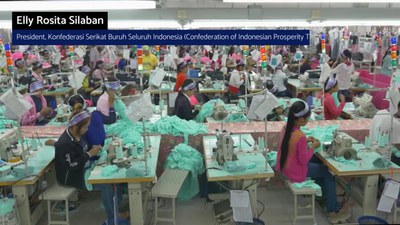
Third-party content disabled. Consent to activate.
Highlights from the webinar "COVID-19 and beyond - Making gender equality a reality"
This video features highlights from the webinar "COVID-19 and beyond - Making gender equality a reality", co-organized by GIZ FABRIC and ILO’s Decent Work in Garment Supply Chains Asia project. The webinar looks at the impact of the COVID-19 pandemic on workers in the textile and...
View
 Asia Garment Hub
|
January 05, 2022
Asia Garment Hub
|
January 05, 2022
Care & Better Factories Cambodia - Guidance Note 3: Referrals in Khmer
Making referrals requires information on appropriate referral services available in the local area. Better Work and CARE International recommends the following steps in making referrals available: Mapping referral systems; Disseminating referral information; Collecting feedback...
View
|
Full View
|
Download
 Asia Garment Hub
|
January 10, 2022
Asia Garment Hub
|
January 10, 2022
Care & Better Factories Cambodia - Guidance Note 4: Monitoring and reporting systems in Khmer
Monitoring and reporting on efforts to prevent and respond to harassment and violence is critical to risk management and driving norm and behaviour change in the workplace. This implementation note is intended to support companies in developing measures which can be monitored and...
View
|
Full View
|
Download
 Asia Garment Hub
|
January 10, 2022
Asia Garment Hub
|
January 10, 2022
FABRIC Asia Knowledge Product Series - KP1: Introduction to Renewable Energy Sourcing
Learn about commercial and industrial (C&I) sourcing of Renewable Energy (RE), technical solutions and their availability by country.
View
|
Full View
|
Download
 GIZ FABRIC Asia
|
January 12, 2022
GIZ FABRIC Asia
|
January 12, 2022
FABRIC Asia Knowledge Product Series - KP9: Different investment models for rooftop solar projects in Bangladesh
This is designed for factory owners in the textile and garment industry. This note introduces the various investment models that factory owners can choose from when implementing a solar system. More specifically, you will find information about ∙ CAPEX vs OPEX investment model ∙...
View
|
Full View
|
Download
 GIZ FABRIC Asia
|
January 13, 2022
GIZ FABRIC Asia
|
January 13, 2022
FABRIC Asia Knowledge Product Series - KP9: Different investment models for rooftop solar projects in Cambodia
Who is this for? Factory owners in the textile and garment industry. This note introduces various investment models that factory owners can choose from when implementing a solar system. More specifically, you will find information about: ∙ CAPEX vs OPEX investment model ∙...
View
|
Full View
|
Download
 GIZ FABRIC Asia
|
January 13, 2022
GIZ FABRIC Asia
|
January 13, 2022
FABRIC Asia Knowledge Product Series - KP9: Different investment models for rooftop solar projects in Pakistan
This note introduces various investment models that factory owners can choose from when implementing a solar system. More specifically, you will find information about: ∙ CAPEX vs OPEX investment model ∙ Decision-tree for selecting the suitable investment model ∙ In detail:...
View
|
Full View
|
Download
 GIZ FABRIC Asia
|
January 13, 2022
GIZ FABRIC Asia
|
January 13, 2022
FABRIC Asia Knowledge Product Series - KP4: Assessing the business case for on-site solar (financial perspective)
Assessing the business case for on-site solar and determining the criteria for a viable solar project will help you make better investment decisions.
View
|
Full View
|
Download
 GIZ FABRIC Asia
|
January 12, 2022
GIZ FABRIC Asia
|
January 12, 2022
FABRIC Asia Knowledge Product Series - KP7: Local financing for C&I solar systems (Bangladesh)
This note provides an introduction to financing solar PV projects in Bangladesh, including: ∙ Key considerations for financing your solar PV project ∙ The typical loan terms in Bangladesh
View
|
Full View
|
Download
 GIZ FABRIC Asia
|
January 12, 2022
GIZ FABRIC Asia
|
January 12, 2022
FABRIC Asia Knowledge Product Series - KP7: Local financing programmes for commercial and industrial solar systems (Cambodia)
This note provides an introduction to financing solar PV projects in Cambodia, including: ∙ Key considerations for financing your solar PV project ∙ The typical loan terms in Cambodia
View
|
Full View
|
Download
 GIZ FABRIC Asia
|
January 12, 2022
GIZ FABRIC Asia
|
January 12, 2022
FABRIC Asia Knowledge Product Series - Solar Thermal Energy in Manufacturing
Learn about about the main solar thermal technologies, possible application areas in manufacturing as well as the advantages and disadvantages.
View
|
Full View
|
Download
 GIZ FABRIC Asia
|
January 12, 2022
GIZ FABRIC Asia
|
January 12, 2022
FABRIC Asia Knowledge Product Series - KP7: Local financing programmes for commercial and industrial solar systems (Viet Nam)
This note provides an introduction to financingsolar PV projects in Cambodia, including: ∙ Key considerations for financing your solar PV project ∙ The typical loan terms in Viet Nam
View
|
Full View
|
Download
 GIZ FABRIC Asia
|
January 12, 2022
GIZ FABRIC Asia
|
January 12, 2022
FABRIC Asia Knowledge Product Series: Assessing the Suitability for Rooftop Solar Projects
Assessing the technical feasibility of solar photovoltaic (PV) systems for your business will help you make better investment decisions.
View
|
Full View
|
Download
 GIZ FABRIC Asia
|
January 12, 2022
GIZ FABRIC Asia
|
January 12, 2022
FABRIC Asia Knowledge Product Series - KP2: How a Solar Photovoltaic System Works
In this 101 crash course you will discover the main components of a solar photovoltaic system, common set-ups, optimal conditions for its installation and general misconceptions.
View
|
Full View
|
Download
 GIZ FABRIC Asia
|
January 12, 2022
GIZ FABRIC Asia
|
January 12, 2022
